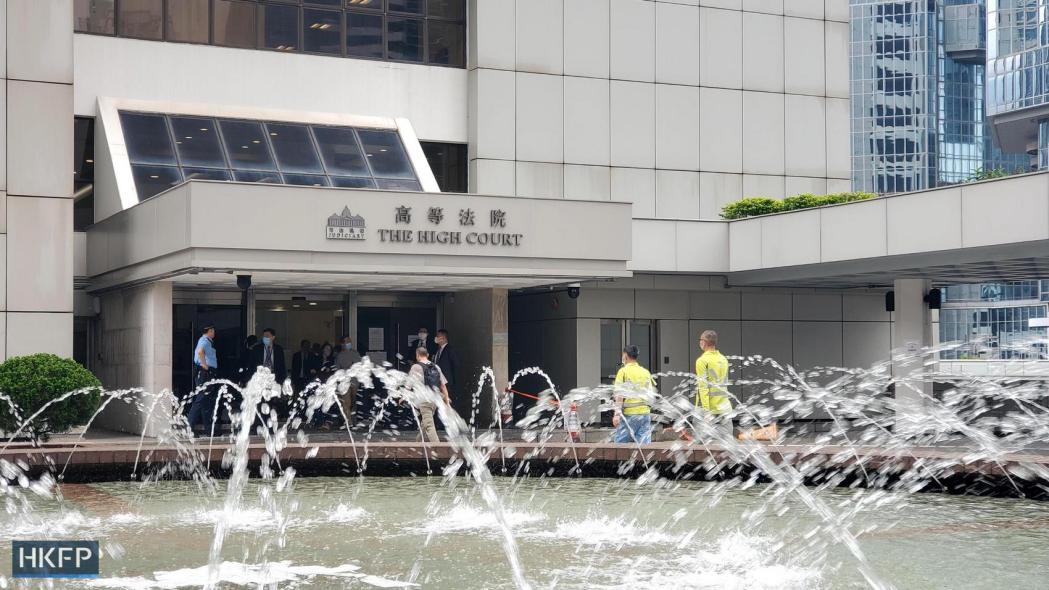A Hong Kong man has been jailed for five years and eight months over plans to place bombs at courthouses and public infrastructure. His three co-defendants aged under 21 were sent to training centres, where they could be detained for up to three years.

High Court Judge Alex Lee on Friday sentenced four people who pleaded guilty to conspiracy to cause explosions likely to endanger life or property. The case involved a total of seven defendants, some of whom were members of the self-proclaimed revolutionary group Returning Valiant.
The defendants, aged between 17 and 21, were charged with one count of conspiracy to commit terrorist activities under the Beijing-imposed national security law. They were said to have planned to manufacture bombs and place them at government facilities, including magistracies and police stations, between April and July 2021.
All four had earlier pleaded guilty to an alternative charge under the Crimes Ordinance, which is punishable by up to 20 years of imprisonment.
In his judgement on Friday, Lee said the offence was very serious and it was aggravated by the fact that it took place against the backdrop of the social unrest in Hong Kong. The defendants intended to destabilise the community, he said, adding the plot would have caused the situation in Hong Kong to descend “from bad to worse” had it succeeded.

“The plan, if succeeded, would seriously undermine the dignity of the judiciary and the symbol of the rule of law,” the judge said.
Lee adopted 8.5 years of imprisonment as the sentencing starting point for 21-year-old Alexander Au, whom he described as being “more culpable” as Au had helped rent a room where the defendants discussed the bomb plots.
In his mitigation plea, Au’s representative told the court that the defendant had committed the offence because he “misunderstood” the situation in society. His client was not a “deep-rooted bad guy,” the lawyer said, adding Au “felt lucky” that the bomb plots did not come to fruition.
“It’s not pure luck. I think it is the good work of police investigation,” the judge responded.
Au was eventually sent behind bars for five years and eight months, after the court gave him a one-third sentence reduction for pleading guilty.
The court imposed a Training Centre Order on 20-year-old Su Wing-ching and two minors surnamed Chan and Law, respectively. Lee said they had played a secondary role in the conspiracy as “foot soldiers” and should not receive a punitive sentence.
Their period of detention, which ranges from six months to three years, would be decided by the corrections chief based on their conduct.
During mitigation, Chan’s lawyer said the mastermind in the case had “compartmentalised” the plot and other members “did not really know the whole picture.” The representative of Law, on the other hand, said his client was remorseful.

“A training centre order is neither too lenient or too harsh for [these defendants],” Lee said.
The mastermind of the case, Ho Yu-wang, who pleaded guilty to the terrorism charge, and another defendant, Kwok Man-hei, applied to adjourn their sentencing. They will return to court on September 27.
Kwok, 20, was among five members of Returning Valiant who were sentenced to a training centre last October for conspiring to incite subversion over calls for an “armed uprising.” The youngest was aged just 15 at the time of their arrest. Their punishment marked the first time minors were sentenced under the sweeping security legislation.
Lee told Kwok’s representative on Friday that the defendant may consider applying for bail if her sentence would not be dealt with in a short period of time.
“But I’m not making promises… I hope the prosecution will take a sensible stance,” the judge said.
The current case involved another defendant Chan Hoi-leung, who was 24 at the time of his arrest. He has not entered his plea.
In June 2020, Beijing inserted national security legislation directly into Hong Kong’s mini-constitution – bypassing the local legislature – following a year of pro-democracy protests and unrest. It criminalised subversion, secession, collusion with foreign forces and terrorist acts, which were broadly defined to include disruption to transport and other infrastructure. The move gave police sweeping new powers, alarming democrats, civil society groups and trade partners, as such laws have been used broadly to silence and punish dissidents in China. However, the authorities say it has restored stability and peace to the city.
Support HKFP | Policies & Ethics | Error/typo? | Contact Us | Newsletter | Transparency & Annual Report | Apps
Help safeguard press freedom & keep HKFP free for all readers by supporting our team
























